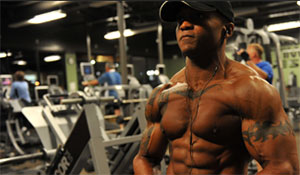
Ask the Flight Surgeon
By Dr. (LTC) Joseph Puskar
 Q: I will be training for an elite military unit doing lots of long-distance runs and other strenuous exercises on a daily basis. I would like to take a supplement to help my after workout recovery. I am 41 years old and take 20 mg simvastatin and 20 mg lisinopril. The product contains the following: L-Glutamine (1000mg); Triple strength Fish Oil (647 mg EPA/263 mg DHA); Joint Comfort Formula (250 mg Acacia catechu wood & bark extract, Chinese Skullcap root extract/100 mg Sicilian blood Orange Fruit & Peel extract (citrus sinesis); Muscle Function Formula X 2 (60 mg magnesium aspartate/ 30 mg zinc/150 mg L-Leucine/50 mg L-Isoleucine/ 50 mg L-valine); Mega Men sport full strength X 2 (Cellulose, Titanium Dioxide (natural mineral whitener), vegetable acetoglycerides, caramel color, ethyl vanillin). Please let me know if it is ok for me to take. If not, I will return to GNC for a refund. Thank you.
Q: I will be training for an elite military unit doing lots of long-distance runs and other strenuous exercises on a daily basis. I would like to take a supplement to help my after workout recovery. I am 41 years old and take 20 mg simvastatin and 20 mg lisinopril. The product contains the following: L-Glutamine (1000mg); Triple strength Fish Oil (647 mg EPA/263 mg DHA); Joint Comfort Formula (250 mg Acacia catechu wood & bark extract, Chinese Skullcap root extract/100 mg Sicilian blood Orange Fruit & Peel extract (citrus sinesis); Muscle Function Formula X 2 (60 mg magnesium aspartate/ 30 mg zinc/150 mg L-Leucine/50 mg L-Isoleucine/ 50 mg L-valine); Mega Men sport full strength X 2 (Cellulose, Titanium Dioxide (natural mineral whitener), vegetable acetoglycerides, caramel color, ethyl vanillin). Please let me know if it is ok for me to take. If not, I will return to GNC for a refund. Thank you.
FS: It appears that this is a fairly safe product for you to take in the recommended serving sizes, and as long as you don’t develop any allergic reactions to the components. Since almost any compound can become toxic in high enough quantities, do not exceed the recommended daily doses. Of the herbal ingredients listed, most have been shown to increase blood flow to muscles and have some anti-inflammatory properties. Caramel coloring has been shown to be a risk factor for type II diabetes independent from high glucose and carbohydrate loads, overall caloric intake, and other commonly recognized dietary stressors, but in the low amounts present in this formulation is not too much of a concern for short-term use. The quantity of caramel found in cola-type sodas can be problematic if taken on a daily basis over many years however, and should be avoided. This brings up the important principle of getting your nutrition from natural, mostly plant-based sources as much as possible to avoid potentially harmful additives and preservatives. An example of a simple post-workout recovery snack would be some roasted and lightly salted edamame (soybeans) that contain all the essential amino acids, a few bananas, and some fruit juice with soy or whey-based protein powder shaken up in it.
The king of all the herbs is basil, and it has been used by endurance and performance athletes since ancient times as an anti-inflammatory and post-exercise recovery aid. It contains many vitamins, minerals, and other nutrients such as beneficial oils and anti-oxidants. Many other herbs such as dill, turmeric, and sage have similar properties, and can be safely worked into your diet as seasonings for salads and soups, garnishes for meats (hopefully wild game, poultry, grass-fed bison, or cattle if you do indulge in meats due to their lower levels of inflammatory mediators compared to their barn-raised, grain-fed cousins!). Check out the book “Eat and Run” by ultra-marathoner Scott Jurek. It contains nutritious and delicious, natural, plant-based performance and workout recovery recipes at the end of every chapter that are fun to make, and is incidentally a great read. Making your own workout supplements at home like this is limited only by your imagination, and in addition to being healthier for you, will be a lot less expensive in the long run.
Recall from your quarterly safety briefings that, per AR 40-8 Temporary Flying Restrictions Due to Exogenous Factors Affecting Aircrew Efficiency, paragraph 6. b., use of dietary supplements, herbal and dietary aids, and performance enhancers, that all supplements, herbal and dietary aids and preparations, and performance enhancers are prohibited unless cleared by the flight surgeon or APA in consultation with applicable APLs.
Safe flying, and see you at the flight line! Doc Puskar
Question for the Flight Surgeon?
If you have a question you would like addressed, email it to This email address is being protected from spambots. You need JavaScript enabled to view it.; we’ll try to address it in the future. See your unit flight surgeon for your personal health issues. The views and opinions offered are those of the author and researchers and should not be construed as an official Department of the Army position unless otherwise stated.
Dr. (LTC) Joseph Puskar is a flight surgeon and the director of the Army Flight Surgeon Primary Course at the US Army School of Aviation Medicine at Fort Rucker, AL.








